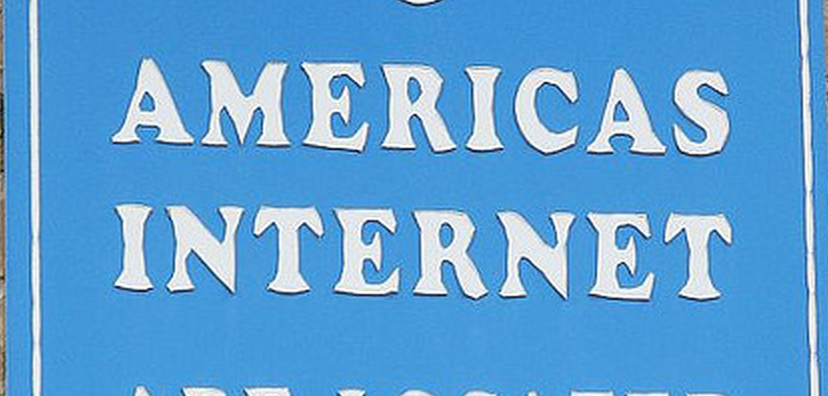FCC: Net Neutrality Doesn’t Violate Internet Service Providers’ First Amendment Rights

(Steve)
“People know… that ordering broadband service from their local cable company is not the same as buying an online subscription to The Wall Street Journal, ordering a new coffee maker from Amazon, or downloading music from iTunes,” writes the FCC in a brief [PDF] filed in federal court this week in response to lawsuits brought by trade group USTelecom and tiny Texas ISP Alamo Broadband. “The first involves signing up for a transmission service that supplies access to those online applications, services, and content; the others are themselves the providers of online content and services.”
When cable/phone/wireless companies pipe data to your smartphones/computers/TVs/ thermostats/crock pots, they are not, per the FCC, “speaking” but “instead merely acting as conduits for the speech of others.”
In its brief [PDF], Alamo claimed that “Broadband providers are speakers because they engage in speech, and they exercise the same editorial discretion as cable television operators in deciding which speech to transmit.”
The company claims the the Order compels providers to “carry all speech, including political speech with which providers disagree.”
But the FCC counters that American consumers don’t associate their ISPs with the content they deliver.
“Nobody understands broadband providers to be sending a message or endorsing speech when transmitting the Internet content that a user has requested,” writes the Commission. “When a user directs her browser to the New York Times or Wall Street Journal editorial page, she has no reason to think that the views expressed there are those of her broadband provider.”
Additionally, the FCC contends that there is no evidence to show that mass-market retail broadband providers are “seeking to convey any particularized message to their users.”
In Texas v. Johnson, the U.S. Supreme Court held that in order for conduct to merit First Amendment consideration, it must manifest “an intent to convey a particularized message” and “be understood [as a message] by those who viewed it.”
“The provision of broadband service lacks these essential characteristics,” writes the FCC, whose brief quotes Duke University law professor Stuart Minor Benjamin: “there is no real basis for contending that mere transmission of bits is ‘speech.’”
In a 2014 Harvard Law Review article, Benjamin likened broadband service to FedEx’s shipping of documents. If the government were to ban shipping companies from charging express delivery rates, it might raise other legal questions, but it wouldn’t be a First Amendment issue.
“Transporting documents does not entail a communication, and thus the First Amendment would not seem to encompass FedEx’s deliveries,” wrote Benjamin in 2014. “FedEx’s delivery of a document communicates no information about the content of that document.”
The FCC also points to the Supreme Court ruling in Rumsfeld v. Forum for Academic & Institutional Rights, Inc., which SCOTUS held that a law requiring universities to allow military recruiters on campus property did not infringe on the schools’ right to free expression.
The court explained in that case that this law “regulates conduct, not speech… the schools are not speaking when they host interviews and recruiting receptions.”
In the FCC’s eyes, net neutrality similarly regulates ISPs’ conduct — by not allowing them to speed up, slow down, or block data based on its source, destination, or its content — but it doesn’t stop these companies from expressing themselves freely.
One of the more controversial aspects of the 2015 Open Internet Order was the reclassification of broadband as a “common carrier,” meaning it would be treated much like landline phone service.
The FCC points to numerous times the Supreme Court has stated that common carriers are not the same as broadcasters. For example, in the 1994 opinion in FCC v. League of Women Voters, the court stated that “Unlike common carriers, broadcasters are ‘entitled under the First Amendment to exercise the widest journalistic freedom.'”
“Like telephone companies, transportation companies, and other traditional common carriers, broadband providers do not have a First Amendment right to restrict or refuse carriage for speech or speakers they dislike,” writes the FCC in its response brief.
As for Alamo’s likening of broadband ISPs to cable TV providers — who are allowed to pick and choose which stations to carry — the FCC contends that this ability to cherry-pick a channel lineup is needed for pay-TV systems, not because of any constitutionally protected free expression, but because of the limits of the technology delivering the TV signal.
But for ISPs, who are merely operating the on- and off-ramps to the Internet for most users, the FCC says “no technological obstacles prevent broadband providers from allowing customers to access all lawful Internet content at all times. The Commission’s no-blocking and no-throttling rules will not reduce access to competing content or to any content offered by the broadband company itself. Nor, in contrast to cable systems and newspapers, is there any established tradition of broadband providers exercising editorial control over Internet content.”
The FCC’s brief notes that it’s this very lack of editorial control over the content being served up to customers that has allowed ISPs to distance themselves from users who violate copyright or are involved in potentially illegal communication.
ISPs do sometimes have ownership stakes in several online media outlets, including Verizon’s recent purchase of AOL, Comcast’s large network of NBC news and entertainment websites, not to mention its recent investments in BuzzFeed and Vox Media.
Had the Open Internet Order interfered with these ISPs’ relationship with their media properties, that would be a definite First Amendment issue. However, the FCC notes that such non-telecom arrangements are “left untouched” by the order.
Nor does net neutrality say anything about which devices consumers can use to go online.
Neutrality does not ‘regulate the Internet,'” says the FCC, using a favorite phrase of neutrality opponents.
Want more consumer news? Visit our parent organization, Consumer Reports, for the latest on scams, recalls, and other consumer issues.

